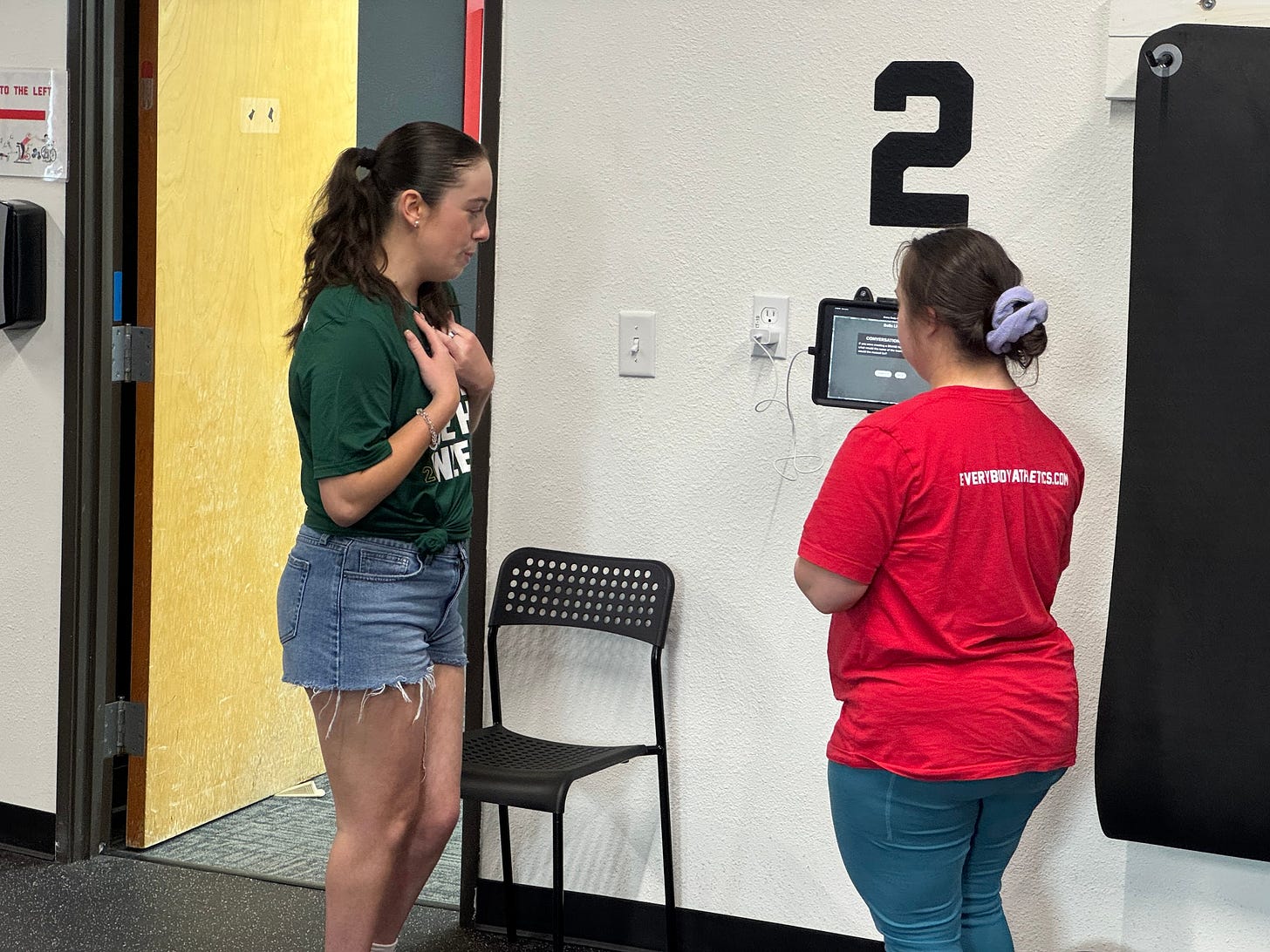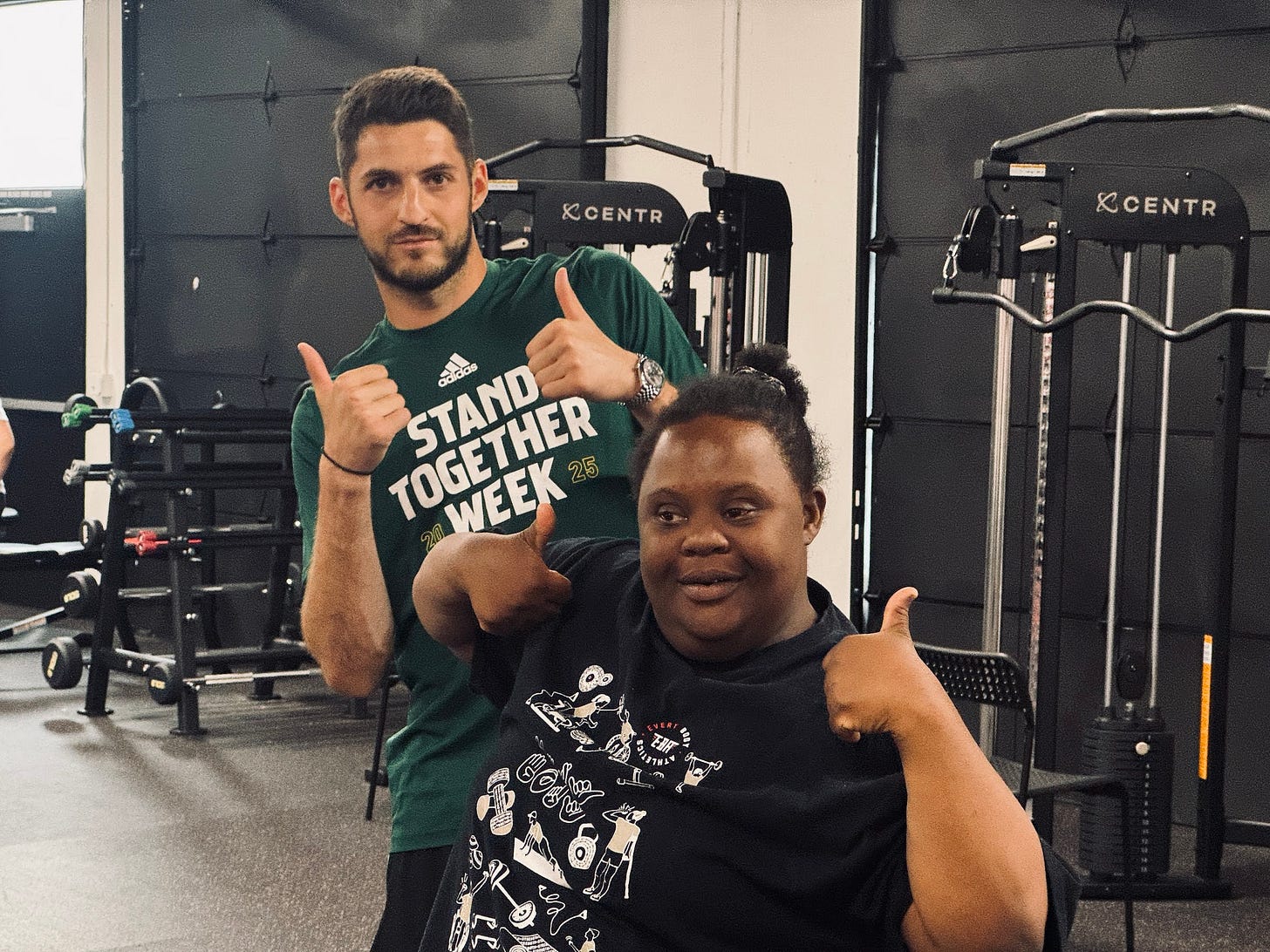Phil Neville on his 'Gift from God' and getting involved with Every Body Athletics
The Portland manager's most humbling experience did not come on the pitch.
The I-5 Corridor is supported by our readers. If you enjoy this free story, please consider supporting our independent sports page with a paid subscription. A year costs about the same as a Postmates order.
BEAVERTON — Chocolate cake lit up Phil Neville’s face.
It was a Wednesday afternoon at Every Body Athletics during the Portland Timbers’ Stand Together Week, an annual event where Portland’s soccer players, coaches and front office members get out into the community for volunteer work. This year, that brought Neville, along with players Kamal Miller, Eric Miller, James Pantemis and Maxime Crepeau to EBA, an athletic facility in a Beaverton business park that hosts classes and workouts for adults with intellectual and developmental disabilities.
Circled around the room, the 27 athletes, teachers and participants ran through a series of stretches while playing ice-breaker games, with everyone sharing their name, where they’re from and their favorite dessert.
There were some crème brûlée fans. Pie got a few votes. And then there was the chocolate cake, a suggestion volunteered by Isabella Neville that put a wide smile on the face of her father sitting by her side.
“We’re really close,” Isabella said later about Portland’s coach. “I spend a lot of time with him anyway, but to spend time with him here is so important.”
Phil had his choice of events to attend during the week. Earlier, a group of players went out to volunteer at Friends of Trees. Another pod made it out to the Children’s Book Bank.
But for the Nevilles, Every Body Athletics was a no-brainer.
That’s because of Isabella, Phil said.
Isabella, 21, has cerebral palsy, a condition that affects movement and posture. Doctors say Isabella likely suffered a stroke while in the womb, was born 10 weeks premature at 3 lb 3 oz and spent the first weeks of her life hooked up to tubes, wires and a ventilator in the Saint Mary’s Hospital NICU in Manchester.
The birth changed everything for the Nevilles, who, after Isabella’s cerebral palsy diagnosis at 18 months, were told that their daughter may never be able to walk.
“For the first month or so, it’s, ‘Why me? Why ours?’ You just feel so sorry for yourself,” Phil said. “But then that changes to giving her as much of a normal life as possible. We’re from a very sporty family, an active family, and we said we’re not going to wallow in this. This is a gift from God into a family that can give her everything she needs to succeed in life.”
The Nevilles did have advantages — one being a considerable amount of wealth. The Nevilles retrofitted their home to make it more accessible. They had access to the best facilities, the best doctors and had a family resolve that kept everyone moving forward.
“'We are determined that Isabella must never feel sorry for herself because she has a disability: she has got so much else going for her,” Julie said in 2008. “In every other way she is such a normal and happy little girl. But we know she still has a lot of difficulties to face in the future.”
Though she wore splints for support, Isabella took her first steps around the age of three. By the time she was 10, Isabella was able to walk and move around completely unaided.
“They said she couldn’t walk. She walked,” Phil said. “They told us she’ll have problems going to mainstream school and she goes to the University of Portland. She’s thriving, driving, going out with her friends on a Saturday night, celebrating holidays, doing things that normally abled people can do. And she’s very lucky that she’s been given that opportunity.”
Here in Portland, Isabella just finished up her second year at UP where she’s studying Marketing with a minor in Fine Arts. After becoming the first disabled model to sign with a mainstream British agency in 2017, Isabella fancies a future in the fashion industry. She said she loves St. Johns, all the things to do around Portland and is grateful for a family that never took “no” for an answer when it came to her future mobility.
“Because my dad was an athlete, he definitely instilled it in me,” she said. “Sometimes he would push me to do things that were out of my comfort zone in sports. I definitely think that built me into a stronger person and definitely got me into sports that I never would have tried.”
The success the Nevilles had in keeping Isabella moving is what drew the family to EBA. When they lived in England, Phil and Julie helped raise nearly £20 million for the Royal Manchester Children’s Hospital Charity. Upon his hiring in Portland, Phil said he met a couple in his then-apartment complex who were involved with Every Body Athletics, which at the time was operating out of temporary spaces. The Nevilles came out to observe a session at a church in Lake Oswego and immediately felt a connection.
“For people with disabilities, at school there are a lot of activities and you are cared for, but when you leave school, those opportunities just seem to go,” Phil said. “We saw how there were great similarities between the challenges that my daughter has had so far in her life. When we saw what Every Body Athletics does, I thought it was a fantastic opportunity. They’re providing a platform for some of these children and families to drop the kids off, exercise and develop social skills. It’s a big part of their lives.”
In December, EBA moved out of its temporary home and into this new 4,000-square-foot facility in Beaverton which is covered in padded flooring, features weights, jump ropes, resistance bands, stationary bikes and elliptical machines. The organization provides physical activities for about 225 athletes each week and even more volunteers who routinely assist in workouts at the gym.
“It’s been a big game changer for us,” said executive director Brad Franklin, who got his Master’s in Special Education at Oregon and founded EBA in 2017. “Just to give them a space with adaptive equipment that we can use for our athletes. We serve a wide spectrum of abilities and needs, so we wanted a spot where we could meet those needs.
“It’s special having Coach Phil here. Phil and Julie have been big supporters of EBA and it seems like that’s just what they do at the different stops they’ve been at. They’re really helping this community.”
Raising money for EBA is a big thing. But more than anything, Franklin said the time donated by all the volunteers is what really makes the gym come alive. On Wednesday, Kamal Miller and Crepeau led one athlete through a shadow boxing routine. Across the gym, Timbers’ mental performance coach Lacey Henderson, who had her right leg amputated above the knee when she was nine, led another group through some plyometrics as goalie James Pantemis made his way around the facility for photobombs.
And while Neville’s scowl and bark would return a few days later during a 2-1 loss to St. Louis on Sunday, it never takes long once getting away from the pitch for a smile to return.
“When your child is on a life support machine, the doctors and the nurses are the real heroes because they make your life in an unbearable situation somewhat a little bit easier,” Phil said. “It's probably one of the most humbling things I've ever been involved in.
“That’s what Isabella has brought into our lives. Every time I see her walk out the door, go to school, drive a car, it’s just — she doesn’t have to do much to make me proud.”
— Tyson Alger, The I-5 Corridor





Great article!
Nice piece, Tyson.